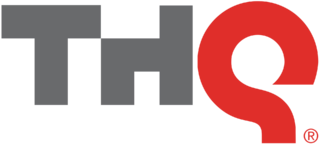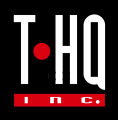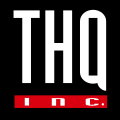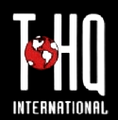Difference between revisions of "THQ"
From Sega Retro
| (21 intermediate revisions by 4 users not shown) | |||
| Line 1: | Line 1: | ||
{{CompanyBob | {{CompanyBob | ||
| − | | logo= | + | | logo=THQ2011.png |
| − | + | | founded=1990-04 | |
| − | | founded= | ||
| defunct=2013-01 | | defunct=2013-01 | ||
| tseries=T-100 | | tseries=T-100 | ||
| − | | | + | | headquarters=5000 N. Parkway, Suite 107, [[wikipedia:Calabasas, California|Calabasas]], California, 91302, United States{{magref|egrn|8|40}}{{fileref|SummerCES1991 Directory.pdf|page=241}} |
| − | | | + | | headquarters2=27001 Agoura Road, Suite 325, Calabasas Hills, California, 91301, United States{{fileref|E32001 Directory.pdf|page=108}} |
| − | | | ||
}} | }} | ||
| − | {{stub}}'''THQ''' (Toy Headquarters), originally styled '''T-HQ''', | + | {{stub}}'''THQ, Inc.''' (Toy Headquarters), originally styled '''T-HQ Inc.''' until 1997, is a former California-based toy manufacturer. It was founded by Jack Friedman, who had previously created [[LJN]]. |
| − | THQ | + | While initially set up to create toy lines, THQ entered the video game business after purchasing [[Brøderbund]]'s video game division in the September of 1990. This division became '''T-HQ Software''', until THQ pulled out of the toy market completely in 1994. |
| − | + | THQ rose to prominence in the 1990s, not just strictly as a third-party publisher, but as a product distributor for companies such as [[Midway]] and, from 1995 onwards, [[Electronic Arts]]{{intref|Press release: 1995-01-04: T-HQ shows new lineup of portable video games and XBAND video game modem at 1995 Winter CES}}. In the mid-1990s, THQ also chose to publish several of its games under different labels; [[Black Pearl Software]] (a company it had acquired in 1993{{intref|Press Release: 1993-06-08: THQ Inc. to Acquire Black Pearl Software}}) was typically seen publishing Sega software, while '''Malibu Games''' (not to be confused with the entirely different [[Malibu Interactive]]) would be used on Nintendo products. | |
| − | + | A UK division, '''T-HQ International, Ltd.''', traded under its own banner for a short period, before reverting to a similar logo as its American parent company. | |
| − | + | Many, but not all, early [[Sega]] games for the [[Game Boy Advance]] were published by THQ in the US, and Sega published a number of THQ titles in Japan during this time period (before THQ set up its own Japanese subsidiary). THQ also distributed Sega products in Australia. | |
| − | |||
| − | |||
| − | |||
| − | |||
| − | |||
| − | |||
| − | |||
| − | |||
| − | |||
| − | |||
| − | |||
| − | |||
| − | |||
| − | |||
| − | |||
| − | + | THQ filed for Chapter 11 bankruptcy protection in January 2013. As part of their liquidation process, THQ's subsidiary [[Relic Entertainment]] was sold to Sega{{ref|https://web.archive.org/web/20130128052945/http://blogs.sega.com/2013/01/24/notice-of-segas-acquisition-of-relic-entertainment-and-some-ips-owned-by-thq-inc/}}. In April of that same year, Nordic Games Holding purchased all remaining properties of THQ, including many franchises owned by them. This led to their subsequent rebranding to THQ Nordic in 2016. | |
| − | |||
| − | |||
| − | |||
| − | == | + | ==Softography== |
| − | + | {{CompanyHistoryAll|THQ|T-HQ Software|T-HQ International|Malibu Games}} | |
| − | |||
| − | |||
| − | |||
| − | |||
| − | |||
| − | |||
| − | |||
| − | |||
| − | |||
| − | |||
| − | |||
| − | |||
| − | |||
| − | |||
| − | |||
| − | |||
| − | {{ | ||
| − | |||
| − | |||
| − | |||
| − | |||
| − | |||
| − | |||
| − | |||
| − | |||
| − | |||
| − | |||
| − | |||
| − | |||
| − | |||
| − | |||
| − | |||
| − | |||
| − | |||
| − | |||
| − | |||
| − | |||
| − | |||
| − | |||
| − | |||
| − | }} | ||
==Gallery== | ==Gallery== | ||
| Line 87: | Line 26: | ||
THQSoftware logo.png|T-HQ Software logo | THQSoftware logo.png|T-HQ Software logo | ||
THQ logo 1994.svg|Logo (1994) | THQ logo 1994.svg|Logo (1994) | ||
| + | THQ logo 1997.svg|Logo (1997) | ||
THQ logo.svg|Logo (2000) | THQ logo.svg|Logo (2000) | ||
| + | THQInternational logo.png|T-HQ International logo | ||
| + | THQ2011.png|Logo (2011) | ||
</gallery> | </gallery> | ||
Latest revision as of 20:14, 7 April 2024

| ||||
| THQ | ||||
|---|---|---|---|---|
| Founded: 1990-04 | ||||
| Defunct: 2013-01 | ||||
| T-series code: T-100 | ||||
Headquarters:
|
This short article is in need of work. You can help Sega Retro by adding to it.
THQ, Inc. (Toy Headquarters), originally styled T-HQ Inc. until 1997, is a former California-based toy manufacturer. It was founded by Jack Friedman, who had previously created LJN.
While initially set up to create toy lines, THQ entered the video game business after purchasing Brøderbund's video game division in the September of 1990. This division became T-HQ Software, until THQ pulled out of the toy market completely in 1994.
THQ rose to prominence in the 1990s, not just strictly as a third-party publisher, but as a product distributor for companies such as Midway and, from 1995 onwards, Electronic Arts[4]. In the mid-1990s, THQ also chose to publish several of its games under different labels; Black Pearl Software (a company it had acquired in 1993[5]) was typically seen publishing Sega software, while Malibu Games (not to be confused with the entirely different Malibu Interactive) would be used on Nintendo products.
A UK division, T-HQ International, Ltd., traded under its own banner for a short period, before reverting to a similar logo as its American parent company.
Many, but not all, early Sega games for the Game Boy Advance were published by THQ in the US, and Sega published a number of THQ titles in Japan during this time period (before THQ set up its own Japanese subsidiary). THQ also distributed Sega products in Australia.
THQ filed for Chapter 11 bankruptcy protection in January 2013. As part of their liquidation process, THQ's subsidiary Relic Entertainment was sold to Sega[6]. In April of that same year, Nordic Games Holding purchased all remaining properties of THQ, including many franchises owned by them. This led to their subsequent rebranding to THQ Nordic in 2016.
Contents
Softography
Mega Drive
- The Great Waldo Search (1992) (as T-HQ Software)
- Wayne's World (1993) (as T-HQ Software)
- Thomas the Tank Engine & Friends (1993) (as T-HQ Software)
- SeaQuest DSV (1995) (as T-HQ International)
- Pinocchio (1996)
- Williams Arcade's Greatest Hits (1996)
- Bass Masters Classic: Pro Edition (1996)
- NBA Hang Time (1996) (as T-HQ International)
- Madden NFL 98 (1997)
- NHL 98 (1997)
- NBA Live 98 (1997)
- Akira (unreleased)
- Operation: Aliens (unreleased)
- The Mask (unreleased)
- Total Carnage (unreleased) (as Malibu Games)
Game Gear
- Michael Jordan: Chaos in the Windy City (unreleased)
- The Mask (unreleased)
Mega-CD
- Akira (unreleased)
- Total Carnage (unreleased) (as Malibu Games)
Saturn
- Adidas Power Soccer (unreleased)
- Destruction Derby 2 (unreleased)
- G Police (unreleased)
- Sentient (unreleased)
- Tenka (unreleased)
Dreamcast
- Coaster Works (1999)
- Carrier (2000)
- Iron Aces (2000)
- WWF Royal Rumble (2000)
- MTV Sports: Skateboarding Featuring Andy Macdonald (2000)
- Evil Dead: Hail to the King (2000)
- Felony Pursuit (unreleased)
PlayStation 2
- Britney's Dance Beat (2002)
- Mr. Incredible: Kyouteki Underminer Toujou (2006)
- Juiced: Tuning Car Densetsu (2006)
- SpongeBob (2007)
GameCube
Wii
- SpongeBob (2007)
Game Boy Advance
- Puyo Pop (2001)
- Columns Crown (2001)
- Sonic Advance (2001)
- Baseball Advance (2002)
- The Pinball of the Dead (2002)
- Sega Smash Pack (2002)
- Virtua Tennis (2002)
- The Revenge of Shinobi (2002)
- Super Monkey Ball Jr. (2002)
- Altered Beast: Guardian of the Realms (2002)
- Phantasy Star Collection (2002)
- Sonic Advance 2 (2002)
- Crazy Taxi: Catch a Ride (2003)
- Sonic Pinball Party (2003)
- Space Channel 5: Ulala's Cosmic Attack (2003)
- Sega Arcade Gallery (2003)
- Jet Set Radio (2003)
- Shining Soul II (2003)
- Sonic Battle (2003)
- Astro Boy: Omega Factor (2003)
- Shining Force: Resurrection of the Dark Dragon (2004)
- Sonic Advance 3 (2004)
- Puyo Pop Fever (2004)
- Gunstar Super Heroes (2005)
- 2 Games in 1: Sonic Advance & Sonic Pinball Party (2005)
- 2 Games in 1: Sonic Advance & ChuChu Rocket! (2005)
- 2 Games in 1: Sonic Advance & Sonic Battle (2005)
- 2 Games in 1: Sonic Battle & ChuChu Rocket! (2005)
- 2 Games in 1: Sonic Pinball Party & Columns Crown (2005)
- 2 Games in 1: Sonic Pinball Party & Sonic Battle (2005)
- Mr. Incredible: Kyouteki Underminer Toujou (2006)
- 2 Games in 1: Columns Crown & ChuChu Rocket! (2008)
Nintendo DS
Gallery
External link
References
- ↑ Electronic Gaming Retail News, "January 1992" (US; 199x-xx-xx), page 40
- ↑ Summer CES Directory, page 241
- ↑ E3 2001 Directory, page 108
- ↑ Press release: 1995-01-04: T-HQ shows new lineup of portable video games and XBAND video game modem at 1995 Winter CES
- ↑ Press Release: 1993-06-08: THQ Inc. to Acquire Black Pearl Software
- ↑ http://blogs.sega.com/2013/01/24/notice-of-segas-acquisition-of-relic-entertainment-and-some-ips-owned-by-thq-inc/ (Wayback Machine: 2013-01-28 05:29)



